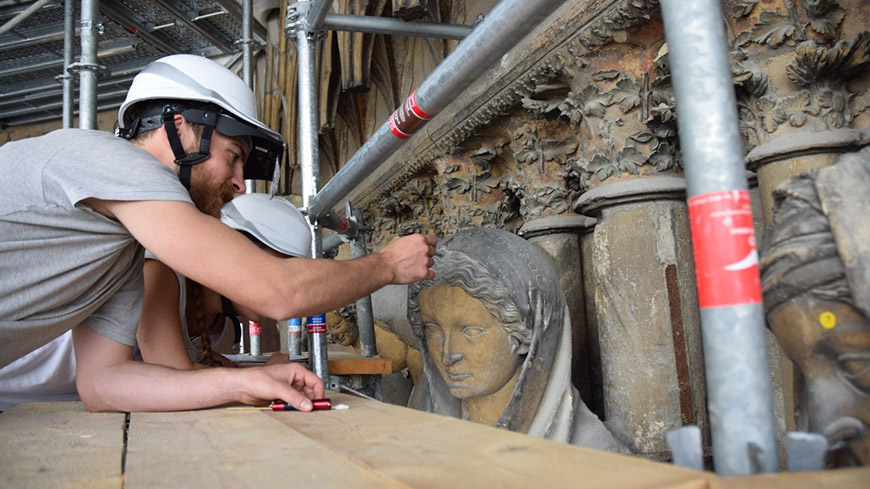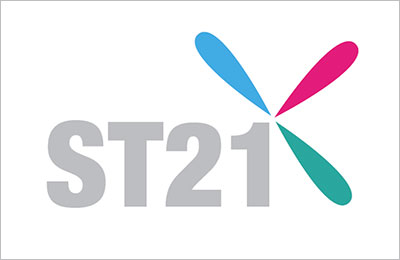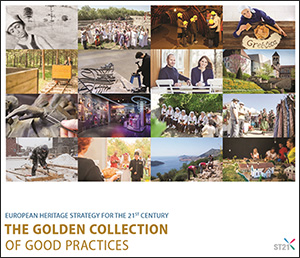Location of the initiative:

Initiator
Academic and scientific institution/Institute
Relation to Strategy 21 Recommendations:
K8 - guarantee the competences of professionals working on the listed heritage
Time span of the initiative:
Start date: 1990 / End date: ongoing
Motivation / Methodology
The INP is in charge of the training of both curators (civil servants) and conservators (mainly freelancers) devoted to the preservation of the collective heritage (challenge S4). Conservators are in charge of the materiality of heritage and curators have responsibilities in institutions or administrations hence participating to the governance (challenge S5). It's important for these future professionals who will have to manage and conserve heritage to be early in contact with authenticity and unicity of it, so they can become efficient and confident facing to the professional reality.
If trainings at INP are based on solid theoretical knowledge (human sciences, ethics, plus physics and chemistry for conservators), a major part of the curricula is devoted to practice with professionals, individual interns in heritage institutions, as well as in-field collaborative experiences in France and worldwide. Students are placed mainly in public institutions and administrations, they become used to the public service approach, they provide a quasi-professional service, they acquire professional habits and also can help to update practices and knowledge. Both students and tutors are generally satisfied of the experience (challenges D7, K1). Moreover, it's often the opportunity to develop a network that will be kept and extended after.
Thanks to its belonging to French Ministry of Culture, several dozens of internships and field-schools are organized each year by INP for the students of both departments. It also involves national and international network. It can be fixed on collections in museums, archives, administrations, historical sites and even UNESCO heritage. For the students in conservation, practice facing authentic heritage starts as early as the first year of the 5-year curriculum. Students are framed by teachers who are also experimented professionals and who gradually select objects and places according to different levels of difficulty and in function of specific skills to acquire. Practice is based on heritage conserved in INP' conservation studios as well as on site or in the heart of institutions. Authentic items are loaned to INP by the network of museums, libraries, archives, etc. This implicates a solid trust in the training institution. This s made possible by the educational staff and administrative team framing the students, by the programme and the opportunities offered in this public training institution, as well as the students themselves. Thanks to a complete entrance examination, profiles are selected to ensure the possibility for students to face authentic heritage as future professionals and to be able to alloy practice with theoretical integrated knowledge.
Obstacles / Barriers
To allow the students to be trained on authentic heritage, the main challenges at INP are:
- the necessity to have a selection of the students by an entrance examination for both departments ; in order to encourage young people from diverse social backgrounds to be prepared to the entrance examination, INP implements preparatory classes for several weeks to improve the accessibility and the diversity of profiles;
- the selection for entrance examination is done each year by external committees; they were briefed under non-discrimination principles before;
- the conception of entrance examination tests is sufficient to identify the suitable profiles and potentials to develop; for example, conservators are tested on artistic skills + sciences + practice of traditional techniques + visual perception, observation and manual practice, etc.
- the management of hundreds of items each year in the 7 conservation studios; this implicates a full-time job for a registrar
- the planning and organization of about 200 individual internships/ year
- the planning and organization of about 20 collective field-schools/ year
- to maintain the relationship with the institutional partners that allows our students to work on authentic heritage that is to maintain the quality of their work and their educational frame
So, the difficulties concern mainly the excellence to maintain to generate a virtuous circle and a win-win partnership for the institutions that host the students or loan some artefacts. At the same time, we have the mission to be accessible to a diversity of students and to develop their potential.
Change / Impact
By conserving authentic heritage, the first impact for the society of this training approach is the contribution to the transmission, valorisation and preservation of its heritage. This can be understood as material but also immaterial heritage such as the knowledge and transmission of ancient practices. For the conservators training, there are many links as they have to know technically and historically ancient techniques, they have to practice them, to interview craftsmen or other specialists to deeply understand the materiality of heritage.
The training in each department implicates heritage in a wide vision as we teach to the students how to deal with different sorts of heritage (artworks, documentation, testimony, industrial, technical, scientific or even natural heritage, etc.).
Another societal impact is the early use of a methodology to face real problems by encouraging the students to consider some specific questions as part of a whole. They are trained to identify and solicitate the expertise of complementary specialists and to work with different colleagues. In-field experiences help the students to acquire some key skills such as management of their time, materials, team-working, etc.
The in-field experiences, individual or collective, are useful to promote an inclusive approach to heritage and to help the students identifying that each structure and each profile has a a place and a role to play in the chain : associations, politics, audience, institutions, etc. And the diverse complementary profiles: scientists, curators, conservators, researchers, registrars, guides, communicants, etc.
The various trainings on authentic heritage allow students to realize their actions as curators and conservators. It obliges them to include these actions in a wider schedule and a wider project than their own intervention. The preparation, the follow-up and feedback are very important and full part of the training during several weeks. This approach encourages both students and their interlocutors to improve the integrated conservation approach. It also encourages everybody to anticipate the sustainability of the actions (study and interventions during an internship or a field-school, for example), to question how they will be part or can help to implement a global strategy to conserve heritage. The sustainability of each project is discussed with the different stakeholders some months before and this analysis ability is fully included to the skills to acquire.
As INP trains curators who are civils servants and conservators with the ability to intervene on public heritage, the programme at INP aims to ensure their future contribution to manage heritage issues at public service levels.
Lessons learned
What we observe from this type of teaching is:
1) The satisfaction of the students, first. They become confident and get used to face to authentic heritage, to balance theory and practice from the very beginning. They develop network throughout their curricula (teachers, stakeholders they have to dialog with, suppliers they have to contact, etc.), including network with students of other specialty or department who share the same field-training (during their curriculum, they experiment at least one field school gathering conservators, registrars and curators on the site, several others with different or same speciality). All these experiences are very useful to be efficient as soon as they are graduated.
2) The satisfaction of the loaners and hosts who allow students to learn and work for a while on authentic heritage. Their feedback shows these forms of trainings are all opportunities to have work done and they consider the results as professional. Quite often, these experiences give opportunity to devote some time to heritage with a transdisciplinary and reflexive approach which is not easy to find in the usual schedule. It's often the occasion to prepare, to test or to start a bigger project.
3) The approach is transferable as soon as some preconditions are created : the training place should have a network, it should convince the partners who entrust heritage that the training framework is trustable, that students have good potential and that they are followed-up and guided to acquire progressively autonomy, critical thinking, analytical mind, scientific method, self-confidence in their practice, used to get advisory opinions, etc. All this supposes a training which is concrete based on practice and interns, nourished by theory of course, but never disconnected of field and global approach. It can implicate the involvement of teachers who are professionals so that they share their everyday questions and issues.
4) The circle can be really virtuous: heritage is conserved, the approach goes in the sense of public interest, heritage professionals can dialogue with their future colleagues, students get used to dialogue with their future collaborators and people responsible. By nature, the approach of entrusting heritage to students generate a bottom-up and top-down dialogue which is fruitful for everybody. It's a win-win partnership. This approach is inclusive and gives a full place to the students - considered as future responsible professionals - in the professional chain.
Online resources
- https://www.culture.gouv.fr/Regions/Drac-Grand-Est/Actualites/Actualites-annees-precedentes/Annee-2018/L-institut-national-du-patrimoine-INP-remporte-un-prix-du-patrimoine-culturel-de-l-Union-europeenne-Concours-Europa-Nostra-2018
- https://fr.wikipedia.org/wiki/Institut_national_du_patrimoine_(France)
- valorising Erasmus students at INP, benefiting of the same methodology on authentic heritage https://www.youtube.com/watch?v=EQtqoyNDQIk
- promotion of the conservation studies for young people at INP, showing the different aspects, the teaching on heritage, the entrance examination https://www.youtube.com/watch?v=3FjMyfcgNY
- promoting the curator studies and the different connections with other jobs, the field work etc
https://www.youtube.com/watch?v=fqvbeZjRCS8
https://www.youtube.com/watch?v=abp2IzWY1lI - describing the integrated programme to support diverse profiles at preparing the entrance examination https://www.youtube.com/watch?v=pmwSsRZgEGQ
Contact information
Contact person: Pauline Chassaing
Organisation: Institut national du patrimoine
Email: [email protected]
Phone: +33673090125
Website: www.inp.fr
Source of financing
Public





